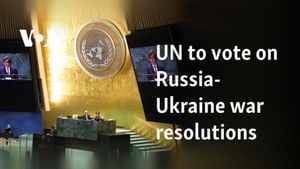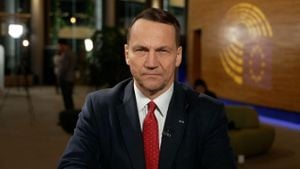Germany is stepping up its military funding as Chancellor-in-waiting Friedrich Merz initiates negotiations for up to €200 billion ($210 billion) aimed at addressing urgent defense needs. This budget, proposed to aid the country’s military, reflects the government’s recognition of the pressing demands for modernization and improvements. Discussions between the Christian Democrats and the Social Democrats are reportedly focusing on how to sidestep Germany’s stringent borrowing guidelines to free up these necessary resources.
According to sources familiar with the discussions, Merz and officials are aiming to fast-track this proposal through Parliament. This potential funding would be double the amount previously approved, demonstrating the heightened urgency surrounding Germany’s defense capabilities, especially following its recent struggles. "We clearly have to make investments to upgrade our military framework. The current state is inadequate," noted Merz, emphasizing the need for rapid modernization.
Across Europe, there are other strategic financial conversations, especially relating to the Ukraine conflict. European leaders are leveraging opportunities to address post-war financial recovery, considering the considerable assets immobilized following Russia’s full-scale invasion of Ukraine three years ago. These frozen assets, valued at billions, could serve as significant funding sources for rebuilding efforts.
Discussions are intensifying about potentially seizing these Russian assets as pressure mounts on European governments to respond decisively to the situation. “We need to act with resolve and decisiveness when addressing our geopolitical realities,” emphasized one EU official speaking off the record.
The situation is particularly complicated with U.S. President Donald Trump reportedly controlling discussions to negotiate peace in Ukraine. Following recent meetings, European officials felt sidelined but are recognizing their own powerful leverage through these assets. Brussels is considering this as part of its strategic response to Russian aggression.
Russia's invasion of Ukraine has not only sparked severe humanitarian crises but has also disrupted the European economy, prompting leaders to seek innovative solutions for financing national defense efforts and recovery. The intention is not solely to bolster military strength but also to address broader issues of national security. “We cannot afford to be passive; we need these funds for our defense and to support our allies,” remarked another source privy to the discussions.
An emergency fund like the proposed €200 billion could significantly alter the defense funding narrative across Europe, setting precedents for future military investment. Experts are debating whether this should merely cover immediate needs or if it might lead to long-lasting strategic enhancements.
This urgency is echoed by military analysts who underline the effects of delayed investments on Germany’s NATO obligations. “With looming threats on the horizon, the time for action is now,” noted one defense analyst.
On the operational front, the type of financial maneuvering being discussed isn't unprecedented but does represent heightened ambition. “Germany’s situation exemplifies the strategic pivot many European nations are facing now. They’re seeking to transform their commitments under NATO,” said Dr. Elizabeth St. John, noted defense policy expert.
Discussions surrounding the military budget have also stirred public discourse about the proper balance between funding defense and social services. Some factions argue for more holistic spending policies, assessing not only military capacity but civic resilience as well.
The European Union’s potential decision to access seized Russian assets will likely provoke significant legal and diplomatic challenges should it materialize. “These decisions, if undertaken, could set concerning precedents for international relations,” cautioned Emily Roy, international law specialist, who advises on asset seizures.
Despite the clear necessity for change, the proposed budget has also faced its fair share of scrutiny. Critics argue the funds could exacerbate tensions rather than resolve underlying conflicts and advocate for diplomatic routes over increased militarization.
Germany’s proposed defense budget is set against the backdrop of past failures to invest adequately and modernize its military, as laid out by government reports highlighting serious deficits. The Pentagon has frequently expressed concern over allies' readiness and military capabilities, making the planned German initiative all the more pivotal.
“If we want to project power and assure our allies, we need to invest,” indicated NATO sources who remain optimistic about the proposed funding initiatives.
The EU’s collective action plan involving the utilization of frozen Russian assets not only reflects the stark realities of the current geopolitical climate but also signals to member countries the necessity of unity and responsiveness. “This is not just about financial resources; it’s about strategic cohesion,” remarked another high-ranking EU official.
While the discussions continue, it remains clear Europe’s funding initiatives must align with long-term strategies for stability and security. Germany’s proposed €200 billion fund could prove instrumental for achieving these goals, but the road to approval will undoubtedly test the resolve of its political leaders.



